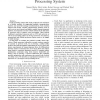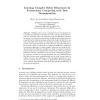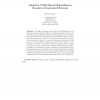707 search results - page 90 / 142 » Experimental comparison of control architectures |
ICAC
2006
IEEE
14 years 3 months ago
2006
IEEE
— Event processing systems link event producers and consumers in a flexible manner, by supporting multiple communication patterns and powerful message transformations. Such syst...
EWLR
1997
Springer
14 years 1 months ago
1997
Springer
Building robots can be a tough job because the designer has to predict the interactions between the robot and the environment as well as to deal with them. One solution to cope the...
AUSAI
2005
Springer
14 years 2 months ago
2005
Springer
This paper addresses the problem of scheduling jobs in soft real-time systems, where the utility of completing each job decreases over time. We present a utility-based framework fo...
LREC
2008
13 years 10 months ago
2008
The goal of this work is to introduce an architecture to automatically detect the amount of stress in the speech signal close to real time. For this an experimental setup to recor...
PLDI
2003
ACM
14 years 2 months ago
2003
ACM
Speculative execution, such as control speculation and data speculation, is an effective way to improve program performance. Using edge/path profile information or simple heuristi...



